
MUSEOLOGIA SCIENTIFICA
Scope & Guideline
Exploring Innovative Practices in Science Museums
Introduction
Aims and Scopes
- Interdisciplinary Museum Studies:
The journal emphasizes an interdisciplinary approach to museum studies, drawing on anthropology, history, science, and education to enrich understanding of museum practices. - Cultural Heritage and Digitalization:
A significant focus on the impact of digital technologies on museum accessibility and the preservation of cultural heritage, examining how museums adapt to the digital age. - Educational Methodologies:
Research on educational strategies within museums, including co-design of activities with school audiences and gamification techniques, aimed at enhancing visitor engagement. - Conservation and Restoration Practices:
Exploration of conservation methodologies and restoration projects within scientific museums, highlighting the importance of maintaining and preserving natural and cultural collections. - Community Engagement and Inclusion:
The journal addresses themes of community participation and inclusion, examining how museums serve diverse audiences and promote social inclusion. - Historical Analysis of Collections:
Investigative studies into the historical context and significance of various museum collections, providing insights into their evolution and cultural relevance.
Trending and Emerging
- Digital Transformation in Museums:
The journal has increasingly published works addressing the impact of digital technologies on museum accessibility and engagement, highlighting the importance of integrating digital tools in museum practices. - Community-Centric Approaches:
There is a growing trend towards community-centric approaches in museum practices, focusing on how museums can better serve and engage with local communities and underrepresented groups. - Sustainability and Environmental Awareness:
Emerging themes related to sustainability practices within museums have gained traction, reflecting a wider societal concern for environmental issues and the role of museums in promoting sustainability. - Multi-Sensory Experiences:
Research on multi-sensory experiences in museum settings is on the rise, emphasizing how sensory engagement can enhance learning and retention for diverse audiences. - Interdisciplinary Collaboration:
An increasing emphasis on interdisciplinary collaboration in museum studies is evident, with papers exploring the integration of various fields such as anthropology, science, and education to enrich museum experiences.
Declining or Waning
- Traditional Exhibition Practices:
There has been a noticeable reduction in research focused on traditional exhibition practices, as the journal increasingly prioritizes innovative display methods and digital engagement strategies. - Historical Artifact Cataloging:
Studies specifically centered on the cataloging of historical artifacts have diminished, with a greater emphasis now placed on the narrative and experiential aspects of museum collections. - Static Museum Spaces:
Research concerning the design and function of static museum spaces appears to be waning, likely due to a growing interest in dynamic, interactive, and multi-sensory experiences. - Single-Discipline Focus:
The journal has shifted away from papers that focus on single disciplines within museum studies, moving towards more integrated and holistic approaches that combine multiple perspectives. - Conventional Visitor Studies:
There has been a decline in conventional visitor studies that primarily focus on demographic data, as the journal now favors studies that explore deeper engagement and interaction with museum audiences.
Similar Journals

Digital Humanities Quarterly
Exploring the future of humanities through digital lenses.Digital Humanities Quarterly, published by the Alliance Digital Humanities Organizations, is a leading open-access journal since 2007, dedicated to advancing research at the intersection of digital technologies and the humanities. With a noteworthy ISSN of 1938-4122, this journal serves as a vital platform for scholars engaging in innovative digital methodologies across diverse fields, including arts and humanities, communication, library sciences, and computer networks. Over its converged years from 2018 to 2024, it has earned impressive rankings, notably being placed in Q2 among peers (2023) in Arts and Humanities, Communication, and Library and Information Sciences. With an impact on critical discourse and practice in digital scholarship, Digital Humanities Quarterly is essential for researchers, professionals, and students aiming to understand and contribute to this dynamic field. The journal is based in the United States at Snell Library 213, Northeastern University, Boston, MA 02115, and strives to connect a global audience through its unrestricted access model.
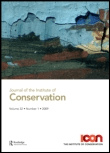
Journal of the Institute of Conservation
Elevating Standards in Conservation Research and PracticeJournal of the Institute of Conservation is a leading academic journal dedicated to advancing the field of conservation, published by Routledge Journals, Taylor & Francis Ltd. With an impressive Q1 ranking in Conservation and a Scopus rank of #21 out of 103 in the Arts and Humanities category, this journal plays a pivotal role in disseminating high-quality research that shapes conservation practices and policies. Spanning the years from 2009 to 2024, it serves as a vital platform for scholars and practitioners alike, offering innovative perspectives on materials science, museology, and media technology. Accessible solely through institutional subscriptions, the journal invites contributions that engage with contemporary issues in conservation, ensuring that all articles foster interdisciplinary dialogue and enhance professional standards within the field. The Journal of the Institute of Conservation is thus essential for those committed to preserving our cultural and natural heritage.

Culture et Musees
Advancing Insights in Museology and the ArtsCulture et Musées is a prominent journal published by ACTES SUD, dedicated to exploring the multifaceted domains of conservation, cultural studies, museology, and the visual and performing arts. With the ISSN 1766-2923 and E-ISSN 2111-4528, this scholarly platform serves as an essential resource for researchers, professionals, and students interested in the dynamic interplay between cultural heritage and contemporary practices. Although the journal does not offer Open Access, it maintains a notable presence in academic circles, evidenced by its rankings in Scopus. In 2023, it ranked in the fourth quartile across various categories, including Conservation and Cultural Studies, reflecting its commitment to enhancing discourse in these fields. By publishing rigorous research, theoretical contributions, and case studies, Culture et Musées aims to bridge academic insights with practical applications, fostering a deeper understanding of cultural institutions and their societal roles. Located in France, this journal is positioned to influence a global audience while enriching local scholarship.
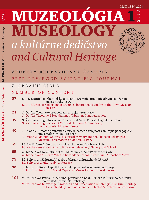
Muzeologia a Kulturne Dedicstvo-Museology and Cultural Heritage
Championing open access to cultural heritage knowledge.Muzeologia a Kulturne Dedicstvo-Museology and Cultural Heritage is a premier scholarly journal published by COMENIUS UNIVERSITY BRATISLAVA, focusing on the vital intersections of museology, cultural heritage, and conservation practices. Since its inception in 2013, this open-access journal has established itself as a leading platform for high-quality research, boasting impressive rankings in the 2023 Scopus metrics—#15 out of 83 in Museology and #28 out of 103 in Conservation. With a commitment to fostering an inclusive academic community, the journal welcomes innovative studies and critical discussions that address contemporary challenges in preserving cultural assets. Operating under an open-access model since 2017, Muzeologia a Kulturne Dedicstvo ensures wide dissemination of research findings, thereby enhancing visibility and accessibility for scholars, professionals, and students worldwide. As it continues to converge from 2013 to 2024, this journal not only serves as a vital resource but also as a catalyst for advances in the understanding and practice of museology and cultural heritage preservation.
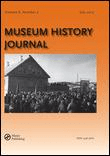
Museum History Journal
Connecting Research and Practice in Museum HistoryMuseum History Journal, published by Routledge Journals, a leading name in scholarly publishing under Taylor & Francis Ltd, serves as an essential platform for advancing knowledge in the fields of conservation, history, and museology. With its ISSN 1936-9816 and E-ISSN 1936-9824, the journal has established its presence in the United Kingdom and offers valuable insights from 2008 to 2024. Currently listed in the Q3 quartile for Conservation, History, and Museology categories, it ranks 677th in History and maintains a commendable percentile of 61% within the Arts and Humanities. Aimed at researchers, professionals, and students, the Museum History Journal strives to promote interdisciplinary dialogue and critical examination of museum practices, historical narratives, and conservation techniques, thereby contributing significantly to the academic discourse surrounding museums and cultural heritage. Access to this journal is crucial for those seeking to deepen their understanding of the evolving role of museums in society.
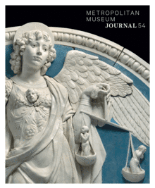
METROPOLITAN MUSEUM JOURNAL
Fostering Scholarly Discourse on Art PreservationMETROPOLITAN MUSEUM JOURNAL, published by the University of Chicago Press, serves as a vital platform for researchers, professionals, and students in the fields of Conservation and Museology. With an ISSN of 0077-8958 and an E-ISSN of 2169-3072, this journal emphasizes the importance of scholarly discourse on art preservation and museum practices. Although it currently holds a Q4 ranking in both Conservation and Museology according to the 2023 category quartiles, the journal continues to contribute to advancements and discussions within these vital fields. Located in Belgium, the journal's mission is to illuminate best practices, innovative techniques, and significant case studies that inform the future of museum work. As an indispensable resource for those dedicated to the arts and humanities, METROPOLITAN MUSEUM JOURNAL fosters a community for exchanging ideas and insights, crucial for the ongoing development and understanding of museum methodologies.
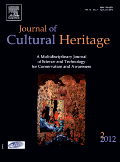
JOURNAL OF CULTURAL HERITAGE
Cultivating Understanding of Our Cultural Roots.JOURNAL OF CULTURAL HERITAGE, published by Elsevier France - Éditions Scientifiques Médicales Elsevier, is a pivotal academic journal dedicated to the multifaceted study of cultural heritage, including its conservation, anthropology, archaeology, and related fields. With an impressive standing in the academic community, this journal has achieved a Q1 ranking in Anthropology, Archaeology, Conservation, and History, reflecting its critical influence and contribution to these disciplines. The journal serves as a vital resource for researchers, professionals, and students interested in innovative research and developments concerning cultural heritage practices and policies. Although it operates under a subscription model, it provides access to innovative research and insights from the field, making it essential for those engaged in the preservation and study of cultural artifacts and historical narratives.
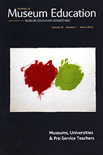
Journal of Museum Education
Connecting research and practice for impactful museum learning.Journal of Museum Education, published by Routledge Journals, Taylor & Francis Ltd, serves as a vital platform for the exchange of ideas and research in the fields of education and museology. With an ISSN of 1059-8650 and E-ISSN 2051-6169, this journal not only holds a prestigious Q2 ranking in Education and a Q1 ranking in Museology for 2023, but it also enriches the academic landscape by positioning itself among the top ten percent in the museology category. Spanning a converged publishing period from 2014 to 2024, the journal aims to foster interdisciplinary dialogue among museum professionals, educators, and researchers by addressing critical issues in museum-based learning and engagement. Although it operates under a subscription model, its compelling scope and focus on innovative educational practices make it an indispensable resource for those committed to enhancing museum education. By contributing to the Journal of Museum Education, authors engage with an audience dedicated to advancing scholarship and practice in this essential area of the arts and humanities.
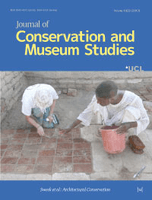
Journal of Conservation and Museum Studies
Fostering Excellence in Conservation and Museology ResearchThe Journal of Conservation and Museum Studies, published by UBIQUITY PRESS LTD, is a vital resource for researchers, professionals, and students engaged in the fields of conservation and museology. With an ISSN of 2049-4572 and an E-ISSN of 1364-0429, this Open Access journal has been committed to disseminating quality research since its inception in 2011. Based in the United Kingdom, the journal features a broad range of topics within its field, serving both theoretical and practical insights for the advancing of conservation practices and museum studies. The journal is highly regarded, standing in the Q2 quartile for both Conservation and Museology categories in 2023, and achieving commendable rankings in the Scopus classification, with a percentile rank of 86th in Museology and 76th in Conservation. This demonstrates its significance as a hub for scholarly communication and innovation, fostering a deeper understanding and appreciation of cultural heritage. Join a diverse community of experts and access cutting-edge research in the field by engaging with this essential journal.

South African Museums Association Bulletin
Discovering Heritage: Where Research Meets InnovationThe South African Museums Association Bulletin, ISSN 0370-8314, is a pivotal resource for researchers, professionals, and students in the fields of Arts and Humanities, Conservation, History, and Museology. Published by the SOUTH AFRICAN MUSEUMS ASSOCIATION, this journal serves as an authoritative platform for disseminating significant research, innovative ideas, and case studies crucial to the museum sector in South Africa and beyond. With an impact factor placing it in the Q3 quartile across multiple categories in 2023, it reflects a growing recognition among the academic community for addressing contemporary issues in the museum field. Though it is not an open-access journal, the Bulletin strives to enhance scholarly discourse by facilitating access to vital resources and studies. Covering converged years from 2019 to 2022, it stands as a beacon for advancing the study and practice of museology, making it an essential read for those dedicated to the preservation and promotion of cultural heritage.